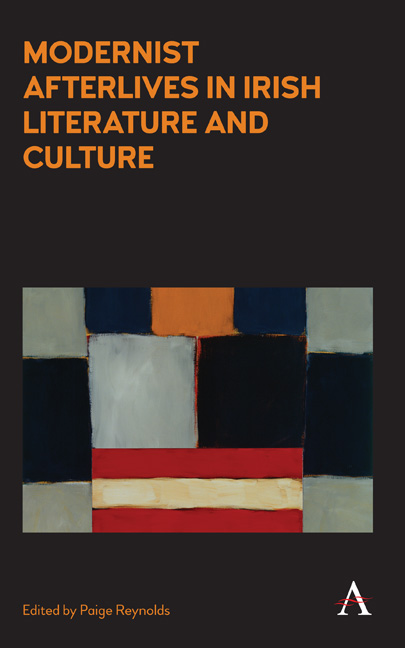Book contents
- Frontmatter
- Contents
- List of Figures
- Acknowledgements
- Introduction
- Section One LITERATURE AND LANGUAGE
- Chapter 1 ‘A World of Hotels and Gaols’: Women Novelists and the Spaces of Irish Modernism, 1930–32
- Chapter 2 ‘I Knew What It Meant / Not to Be at All’: Death and the (Modernist) Afterlife in the Work of Irish Women Poets of the 1940s
- Chapter 3 ‘Whatever Is Given / Can Always Be Reimagined’: Seamus Heaney's Indefinite Modernism
- Chapter 4 James Joyce and the Lives of Edna O'Brien
- Chapter 5 Modernist Topoi and Late Modernist Praxis in Recent Irish Poetry (with Special Reference to the Work of David Lloyd)
- Chapter 6 ‘Amach Leis!’ (Out with It!): Modernist Inheritances in Micheál Ó Conghaile's ‘Athair’ (‘Father’)
- Section Two INSTITUTIONS, ART AND PERFORMANCE
- Afterword: The Poetics of Perpetuation
- Notes on Contributors
- Index
Chapter 3 - ‘Whatever Is Given / Can Always Be Reimagined’: Seamus Heaney's Indefinite Modernism
from Section One - LITERATURE AND LANGUAGE
Published online by Cambridge University Press: 22 July 2017
- Frontmatter
- Contents
- List of Figures
- Acknowledgements
- Introduction
- Section One LITERATURE AND LANGUAGE
- Chapter 1 ‘A World of Hotels and Gaols’: Women Novelists and the Spaces of Irish Modernism, 1930–32
- Chapter 2 ‘I Knew What It Meant / Not to Be at All’: Death and the (Modernist) Afterlife in the Work of Irish Women Poets of the 1940s
- Chapter 3 ‘Whatever Is Given / Can Always Be Reimagined’: Seamus Heaney's Indefinite Modernism
- Chapter 4 James Joyce and the Lives of Edna O'Brien
- Chapter 5 Modernist Topoi and Late Modernist Praxis in Recent Irish Poetry (with Special Reference to the Work of David Lloyd)
- Chapter 6 ‘Amach Leis!’ (Out with It!): Modernist Inheritances in Micheál Ó Conghaile's ‘Athair’ (‘Father’)
- Section Two INSTITUTIONS, ART AND PERFORMANCE
- Afterword: The Poetics of Perpetuation
- Notes on Contributors
- Index
Summary
Whatever is given
Can always be reimagined.
– Seamus Heaney, ‘The Settle Bed’At a moment when theories of postmodernism seemed to offer the most comprehensive assessment of post-war literature and culture, Seamus Heaney argued for the continued relevance of the modernist project. In a 1986 essay, ‘The Impact of Translation’, Heaney evaluates the legacies of modernism:
The breach made by the war years did not succeed in dissociating Lowell and his contemporaries living under the roof of English from the enterprise of the great modernists. Pound and Eliot and Joyce may have regarded themselves as demolitionists of sorts but from a later perspective they turned out to be conservationists, keeping open lines to the classical inheritance of European literature. In getting ready for the end of the world, they extended its life expectancy, indefinitely.
Heaney's historical approach to the European literary tradition leads him to view modernism and postmodernism as productive moments in its survival and expansion. He draws attention to modernism as a movement poised between tradition and innovation, the past and the future. He returned to the modernists over the course of his career to determine his own role in continuing their work of cultural conservation. Reading the potential multiple meanings of his final word here – ‘indefinitely’ – signals an important tension in this ongoing evaluation of modernism. First, the modernists made possible an indefinite, potentially unending lifespan for the European literary tradition, a tradition in which he could participate in the years of the Troubles. However, the outcome of this modernist inheritance may be viewed as indefinite, uncertain or ambiguous.
In recent years, the field of modernist studies has shared Heaney's sense that the inheritance of the modernist project remains indefinite (in both senses). For example, a recent PMLA article by David James and Urmila Seshagiri tracks how contemporary novelists such as Tom McCarthy, Ian McEwan and Zadie Smith ‘reassess and remobilize narratives of modernism’. Heaney offers a compelling case study that extends this conversation in terms of genre, geography and history.
- Type
- Chapter
- Information
- Modernist Afterlives in Irish Literature and Culture , pp. 35 - 48Publisher: Anthem PressPrint publication year: 2016



